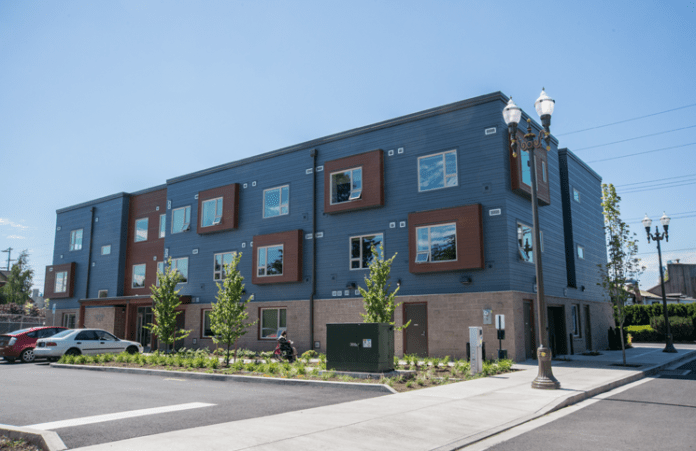The Vancouver City Council is currently considering whether to refer a ballot measure to the November 2016 ballot that would ask voters to increase their property taxes in order to create a dedicated stream of revenue to pay for building new affordable housing, homeless prevention services, and helping first-time homebuyers make a down payment on a new house.
As the proposal currently stands, the tax would generate approximately $6 million each year for seven years by taxing 36 cents per $1,000 of assessed property value, which equates to about $90 a year for an owner of a $250,000 house.
The tax is part of a set of recommendations developed by the city’s Affordable Housing Task Force, convened by Mayor Tim Leavitt to address the rapid rent increases and shortage of affordable housing in the Vancouver area.
According to Apartment List National Rent Reports, Vancouver has the fastest rent growth of any city in the nation – rents have increased by 16.7 percent in the last year, and the city’s rental housing market has had less than a 2 percent vacancy rate for about 18 months. And, according to city figures, a growing number of households are spending more of their incomes on rent: there are approximately 80,000 households in Vancouver, and a little over 16,000 households spend at least 30 percent of their income on housing costs, while approximately 7,100 homes are “rent-burdened,” meaning that more than 50 percent of the renter’s income is spent on housing costs.
Morgan Shook, a director of ECONorthwest, an economic consulting firm in Portland and Seattle, said a constrained housing market can negatively impact a city’s ability to grow.
“By constraining supply and increasing prices, fewer and fewer people are able to live in productive areas; places just can’t grow,” he said. “By opening up that channel, you put idle productivity that is being priced out and put them in places where there is more economic opportunity.”
But Vancouver’s city council is reticent to refer the property tax to voters without a clearer campaign message and more information.
“The people I’m taking with about this bluntly say ‘no, you cannot reach into my wallet to help other families,’” Councilman Jack Burkman said at the council’s May 2 meeting. “I’m very skeptical we can package this in a way that will actually pass in November. The worst case scenario is that it goes to voters and they say no.”
Burkman suggested waiting until the 2017 ballot. Other council members countered.
“The need needs to be met now,” Councilwoman Alishia Topper said. “Nobody likes to talk about taxes, [but] we have the statistics, we know we have raising rents and a tight rental market.”
Builders and developers aren’t entirely sold on the idea of the property tax – even if it creates more money for building housing.
Troy Johns, owner of Urban NW Homes, which builds green single-family homes, said Vancouver’s urban growth boundary should be expanded to allow for building more single-family homes and that zoning codes need to be more flexible to allow for building more accessible dwelling units (ADUs) and other types of housing communities.
“It’s hard for me to stand behind a tax when it’s really easy to fix the problem,” he said. “The housing crunch is man made. They have choked the supply down because of the growth boundary lines. If there was more supply, there would be no problem.”
Jack Harroun, owner of Jack Harroun Construction and immediate past president of the Building Industry Association of Clark County, sat on the Affordable Housing Task Force Committee along with Johns and agreed that loosening regulations would help decrease the cost of housing.
Harroun criticized cities for “adopting regulations that keep increasing the cost of housing,” such as adding permitting fees, impact fees for local school districts, transportation, water and sewer and new regulations related to electrical, insulation, and seismic systems and new energy requirements.
Property tax levies around the state
If Vancouver voters passed a property tax levy, it would be the third city in Washington to do so.
Seattle has had a housing levy in place since 1981, which has been approved five times by voters in large margins and generated more than $400 million since its existence. The levy has leveraged other state and federal dollars to build more than 12,500 apartments units.
More recently, in 2013, Bellingham’s voters created the Bellingham Home Fund by a 56 percent margin. As in Seattle, Bellingham’s Home Fund brings in other dollars to the city. According to city figures, for every one dollar generated by local taxes, the Home Fund leverages another seven dollars from state and federal dollars.
“A levy fund is not the only amount going into your community,” Tara Sundin, Bellingham’s community and economic development manager, explained. “We are usually only funding about 10 percent in a project. The rest of [the costs] are being leveraged through private financing, tax credits and state funding.”
According to Shook, property tax levies are “very effective” sources of revenue, adding that “the more local leverage you can bring in, the more you can really access equity.”
Shook said that housing projects that apply for financing through competitive bid processes are more likely to be successful because funders can see there is local investment.
While Bellingham has completed building just 50 out of 400 funded housing units, Sundid said the Home Fund has already lead to urban revitalization. One development, for seniors and formerly homeless people, is located in a neighborhood associated with criminal activity. Now that the building is going in, Sundin said more developers are seeking permits to the build in the area, also.
“We’re seeing that pioneer projects can lead to interest from the development community,” she said.





